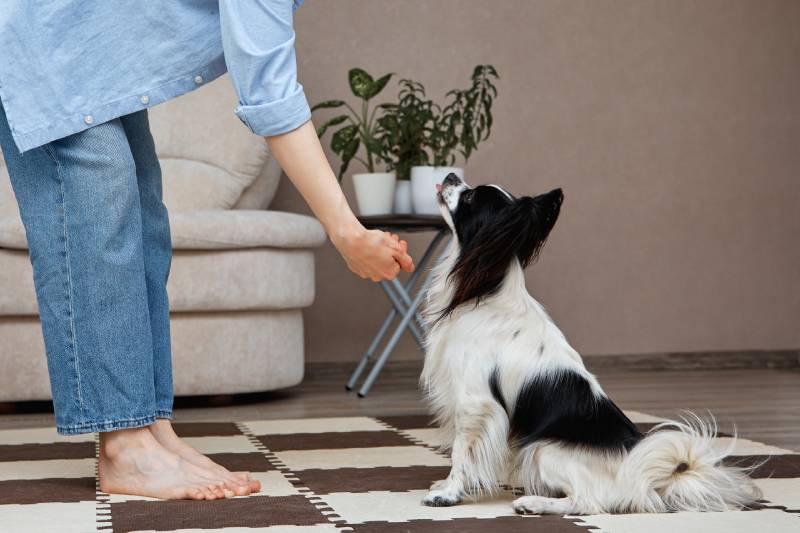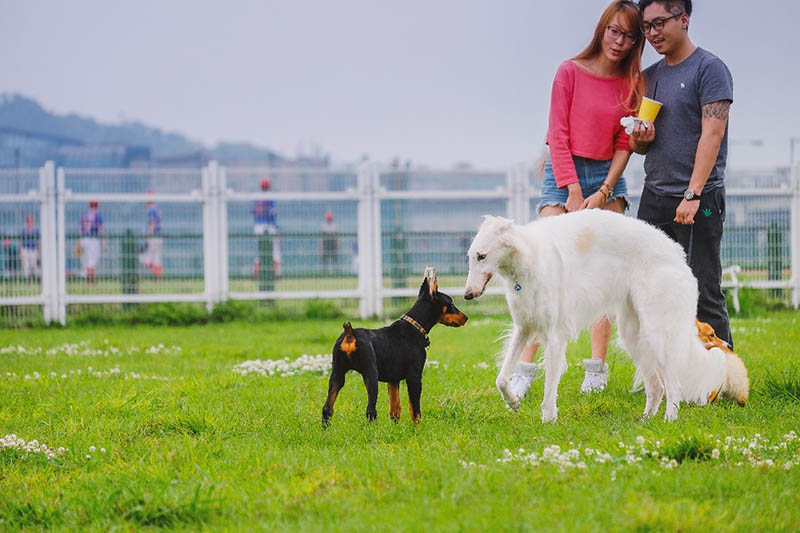Dog Won’t Lay Down? 5 Vet-Reviewed Reasons & Advice
Updated on

If your dog tries to lie down but can’t seem to get comfortable, it’s time to sit up and pay attention. The inability to lay down is often the cause of an underlying problem—some of which can be pretty serious. Your dog may seem to avoid lying down altogether. Or, when they do lie down, they may struggle to get comfortable or assume an unusual position. They may get up and down a lot—a sure sign that they’re having some issues getting comfortable.
In this article, we’ll take a look at some of the reasons your dog may not want to lie down. This tends to be a sign that your pet needs to go to the vet, as many of these medical conditions require veterinary treatment – which is luckily most often quick and efficient. If your dog won’t lay down or can’t get comfortable, chances are good that the reason is listed below.
The 5 Reasons Your Dog Won’t Lay Down
1. Joint Pain
Joint pain can be it difficult for your dog to get comfortable when laying down. Canine osteoarthritis may cause your canine to get uncomfortable when laying down, or it may cause the process of laying down to become painful.
Often, these dogs will shift around when they’re lying around. They may become stiff after lying down for some time and spend a lot of time pacing around.
Dogs may pant as a sign of pain, or they may groan or yelp when laying down. These are obvious signs of pain and warrant a trip to your vet. While arthritis can’t be treated, pain medication is available to help your dog deal with the symptoms.
Some dogs are more at risk of joint pain and arthritis than others. These include older dogs. Obese dogs and giant breed dogs are particularly prone to this issue.
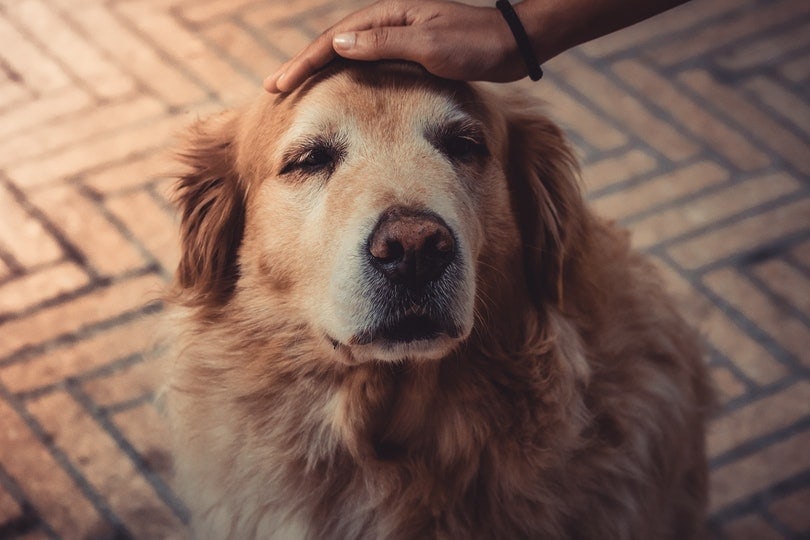
2. Dementia
Like people, older dogs can develop dementia as well. Cognitive decline is typical in older dogs, with dementia sometimes developing. Often, the earliest signs of dementia are changes in your dog’s sleep habits. This can include restlessness and incomplete sleep cycles. The dog’s sleep period may shorten, and they may get up more often before settling into sleep.
Other signs of dementia include confusion. Your dog may forget daily routines or get lost in places they frequent. The dog may not stick to any schedule like it used to.
More extreme symptoms of dementia include getting “stuck” in corners. The dog isn’t stuck but may “forget” that it can turn around to get out. They may wait at the wrong end of a familiar door, where the hinges are, instead of where the doorknob is.
Medications and special diet management plans exist to help reduce the damage and progression of these dementia symptoms, so make an appointment with your vet as soon as you notice.
3. Pancreatitis
If your dog suddenly doesn’t lay down, it can be a sign that they are in severe pain. When they lay down, they may feel pain and pressure in that one particular spot. Pancreatitis occurs when the pancreas suffers an inflammatory reaction, which can cause pain and discomfort.
A sure sign of pancreatitis is dogs assuming the “praying” position for an extended period. In other words, when the dog lays with their head and front legs down, but its butt stuck up in the air. This helps relieve pressure on the pancreas.
Nausea, diarrhea, lethargy, and decreased appetite are also common symptoms. Pancreatitis can be chronic or acute. Luckily, it is treatable with quick action.
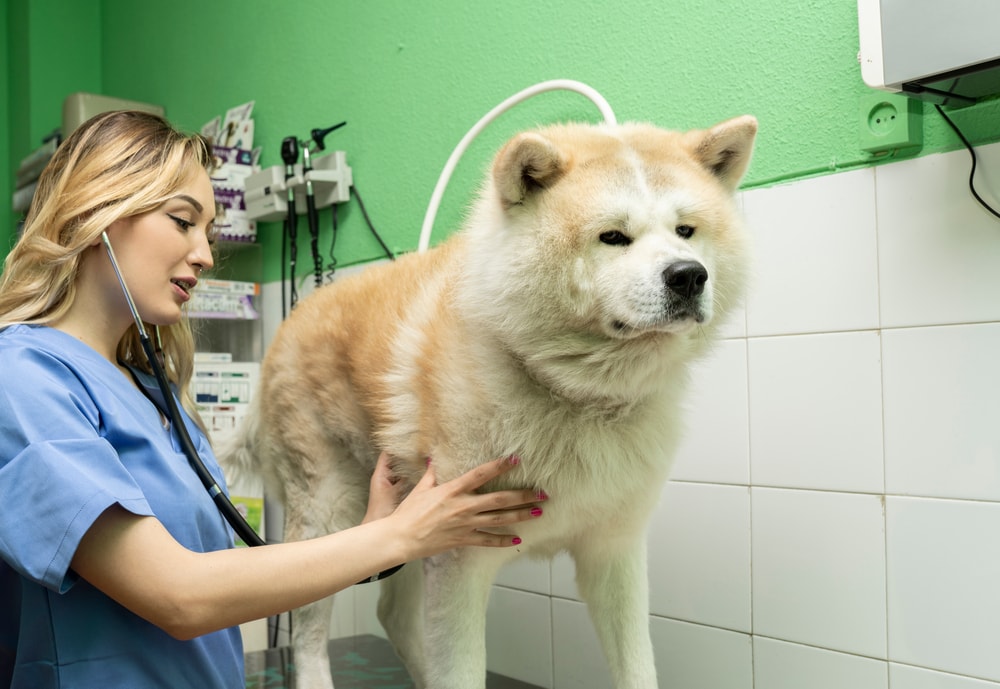
4. Anxiety
Dogs with anxiety problems may have difficulty getting comfortable and laying down. They may lay down for a moment and then stand up after only a few minutes. Pacing may occur as well. Destructive behaviors like chewing and scratching may occur. These are natural ways for dogs to relieve their anxiety.
They may also bark randomly at seemingly nothing, pan, or shake when laying down.
Anxiety is a complicated diagnosis and often has many treatment options. Medication is available, but many dogs can relieve their anxiety through behavioral training.
5. Bloat
Bloat is a severe and sudden disease that requires immediate treatment. When a dog gets bloat, its stomach fills with gas. It may twist, which can make the situation even more severe. The expanded stomach puts pressure on the other organs and the inner cavity. For this reason, dogs may be unable to get comfortable when lying around. Their stomach may become large and bloated, but this isn’t always the case.
Anxiety, like restlessness and pacing, is quite common. Usually, the dog will avoid laying down. Vomiting up new food and drink may occur, or the dog may attempt to vomit but cannot throw anything up.
Excessive drooling, pale gums, and weakness can occur as the disease progresses. Larger dogs are more prone to bloat, but any dog can develop it at any age. Bloat will lead to death unless it is treated with surgery. It is a medical emergency and needs to be addressed as soon as possible, does not get better on its own.
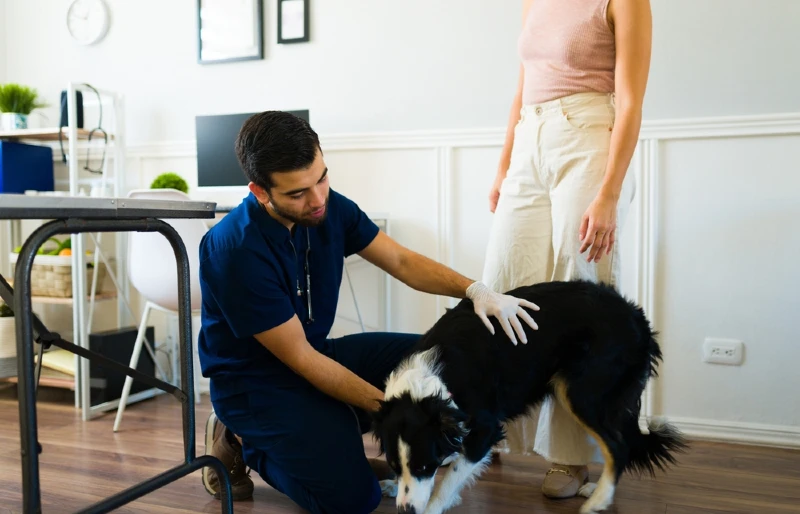
6. Heart Disease
Heart disease can cause a dog to be more uncomfortable in general. It can affect a dog’s ability to breathe, becoming even more complicated when laying down. Dogs with severe heart disease may attempt to sleep standing up or sitting, as laying down can be highly uncomfortable.
Heart disease can be managed with medication and dietary changes. It isn’t curable, but it can be managed with some ease.
Final Thoughts
A dog that can’t lay down is often having trouble getting comfortable. This can be caused by an upset stomach or something more serious, like bloat. If your dog is uncomfortable, you should keep your eye out for other symptoms. Medical attention may be required. More severe conditions often lead to other symptoms, but this isn’t always true. If your dog appears to be in severe pain, it is time to call your vet.
It can be challenging to figure out why exactly your dog can’t lay down at home. However, your vet should be able to run tests to determine what is wrong with your canine.
Related Reads:
- Ant Bites on Dogs: Signs, Treatment, and Prevention
- My Dog Coughs After Drinking Water – Is This a Bad Thing?
Featured Image Credit: Claudiu Alin, Shutterstock



